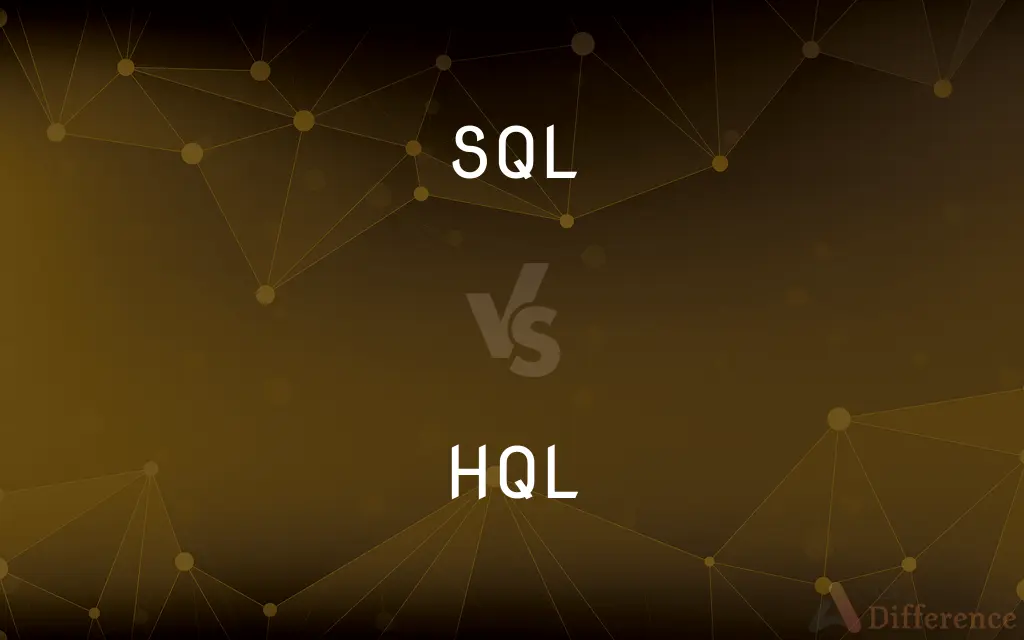SQL vs. HQL — What's the Difference?
By Tayyaba Rehman — Published on December 28, 2023
SQL is a standard language for relational database management and operations, while HQL is a query language designed specifically for Hibernate ORM framework.

Difference Between SQL and HQL
Table of Contents
ADVERTISEMENT
Key Differences
SQL, which stands for Structured Query Language, is a standardized language used to manage and query data held in relational database management systems (RDBMS). HQL, on the other hand, is the Hibernate Query Language designed for the Hibernate ORM (Object-Relational Mapping) framework.
While SQL operates on tables and columns, which are database entities, HQL operates on Java classes and their properties, focusing on the object-oriented model. This means HQL understands concepts like inheritance, polymorphism, and association present in Java classes.
SQL is widely adopted and supported by most relational databases, including MySQL, PostgreSQL, and Oracle, among others. In contrast, HQL is specific to Hibernate and isn't applicable to databases that don't use the Hibernate framework.
In SQL, queries are written considering the physical schema of the database. In HQL, the queries are written against the logical schema or the entity objects and their relationships, abstracting away the details of the underlying database tables and columns.
Summing up, while SQL and HQL serve the purpose of querying databases, SQL is universal for relational databases, focusing on tables and columns. HQL is a specialized language for Hibernate, emphasizing the object-relational model of Java classes.
ADVERTISEMENT
Comparison Chart
Scope
Universal for RDBMS
Specific to Hibernate framework
Operates On
Tables and columns
Java classes and properties
Underlying Concept
Relational database model
Object-relational model
Supported Databases
Almost all RDBMS (e.g., MySQL, PostgreSQL)
Databases using Hibernate
Schema Focus
Physical schema (database layout)
Logical schema (entity objects & relationships)
Compare with Definitions
SQL
SQL is used to create, modify, manage, and query data.
You can create a new table in a database using SQL commands.
HQL
HQL operates on the object-relational model.
In HQL, you can query data based on the properties of a Java class, not just table columns.
SQL
SQL is a standardized language for querying relational databases.
With SQL, you can retrieve all records from a table named employees.
HQL
HQL can handle polymorphism and inheritance in Java classes.
HQL queries can be written to retrieve data from a parent class and its subclasses.
SQL
SQL is supported by a variety of database systems.
Microsoft SQL Server and MySQL both use SQL for database operations.
HQL
HQL is the query language of the Hibernate ORM framework.
Using HQL, developers can retrieve data based on Java class attributes.
SQL
SQL operates on the relational database model.
In SQL, data is stored in tables which can have relationships with other tables.
HQL
HQL provides a bridge between the object-oriented and relational worlds.
HQL allows developers to work with databases using an object-oriented approach.
SQL
SQL can be embedded in other programming languages.
In a Python program, you can use SQL queries to interact with a database.
HQL
HQL abstracts database-specific dialects.
With HQL, you can write one query that works across different types of databases.
Common Curiosities
What is the primary use of HQL?
HQL is used for querying databases within the Hibernate ORM framework.
Which is more versatile, SQL or HQL?
SQL is more versatile in terms of database support, but HQL offers object-relational mapping benefits.
Can I use SQL to interact with any database?
SQL is supported by most relational databases, but the specific syntax might vary.
Is HQL similar to SQL?
While HQL is influenced by SQL, it's designed for Hibernate and focuses on Java classes, not tables.
Does HQL support JOIN operations like SQL?
Yes, HQL supports JOIN operations, but they're based on object relationships, not just tables.
What does SQL stand for?
SQL stands for Structured Query Language.
Which databases support HQL?
Any database that's compatible with Hibernate can support HQL.
Can I use HQL without Hibernate?
No, HQL is specifically designed for the Hibernate framework.
Can I use SQL commands in HQL?
While HQL is influenced by SQL, it has its own syntax. However, Hibernate does allow native SQL queries.
Is SQL case-sensitive?
Typically, SQL keywords are not case-sensitive, but identifiers like table or column names might be, depending on the database.
Is it possible to write an HQL query that's database-independent?
Yes, one of HQL's advantages is its ability to abstract away database-specific dialects.
Which is older, SQL or HQL?
SQL is older and has been around since the 1970s, while HQL was introduced with Hibernate in the 2000s.
Share Your Discovery

Previous Comparison
ACA vs. AKC
Next Comparison
Was vs. Have BeenAuthor Spotlight
Written by
Tayyaba RehmanTayyaba Rehman is a distinguished writer, currently serving as a primary contributor to askdifference.com. As a researcher in semantics and etymology, Tayyaba's passion for the complexity of languages and their distinctions has found a perfect home on the platform. Tayyaba delves into the intricacies of language, distinguishing between commonly confused words and phrases, thereby providing clarity for readers worldwide.
















































